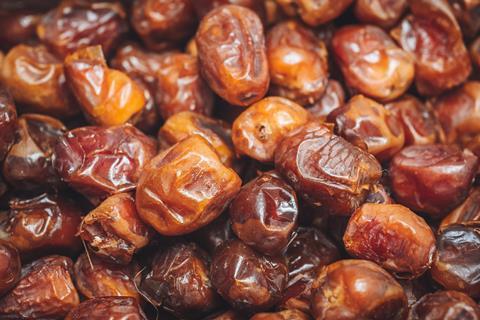Comment: Sweet but stacked with health benefits, dates are perfectly positioned to capitalise on rising UK demand for ‘mindful snacking’

Consumer habits are rapidly shifting when it comes to snacking, as more and more shoppers seek minimally processed, natural alternatives to their favourite sweet treats. That is why dates, which were once the niche ‘Christmas-only’ snack, are making their way to high street stores and onto the UK’s health-conscious snacking scene.
Britain’s fresh fruit and vegetable industry is quickly adjusting to this shift by supermarkets and retailers are stocking up on these fibre-packed snacks. Medjool dates, the classic variety that has long dominated the market, is now being put up against exciting varieties such as Deglet Nour and Sukkari, which are entering the spotlight.
Dates go mainstream
There is no need to sacrifice indulgence as those seeking to reduce their refined sugar intake – while still wanting their sweet fix – can benefit from all the elements that dates bring. Fibre, minerals, and vitamins such as A, B6 and K can be found in this super snack, boosting energy levels and removing that snacking guilt.
Because of their versatile use, dates can be popped into a breakfast bowl, blended into a super energy bite, or enjoyed straight out of the pack.
However, not all dates are created equal. And this is where the conversation gets interesting for decision-makers working in the UK’s fresh fruit and vegetable supply chain as we investigate the differences between the ‘big three’ varieties: Medjool, Deglet Nour, and Sukkari.
Medjool dates
Found in the fruit and vegetable section in supermarkets, the classic ‘king of dates’ is renowned for its large size and recognised widely throughout the UK. Although classified as a dried fruit, most stores will stock these snacks next to other fresh fruit produce, due to their high-moisture content and preservation needs.
With a rich, toffee-like taste with a chewy texture, medjool dates – although higher in calories – are rich in B vitamins, which improve metabolism. They also have 50 per cent more potassium than bananas, helping to combat fatigue. Despite these health factors, the bigger portion sizing can pose a problem for those wishing to cut down and consume in moderation.
Deglet Nour dates
Found in the dried fruit section of supermarkets, much like Medjool, Deglet Nour dates are known for being slightly easier to use when cooking. This is because of their firm texture, which allows them to be perfectly versatile for different cooking or baking needs.
The variety is known for its delicate taste, containing notes of honey and almond, which makes it no surprise as to why it is used as a natural sweetener. Even though they are a cost-effective option for use in the kitchen, they are not said to be as popular for being an everyday snack choice.
Sukkari dates
Sukkari dates – the variety offered by up-and-coming UK brand Datekin – offer a lower price tag but are known as the ‘queen of dates’ in some markets. These melt-in-the-mouth treats are best known for their rich, caramel-like flavour, allowing consumers to get a sweet but healthy fix.
The pocket-sized snack, soft and golden in colour, delivers a portioned treat that satisfies without encouraging overindulgence. With balanced sizing and sweet intensity this variety has a range of health benefits, including being good for digestive health and brain function. These dates are shedding their previous ‘dried fruit’ image and instead are becoming a convenient on-the-go choice for the snacking and lunchbox markets.
Growth potential
Whole food and plant-based snacking continue shape shopping behaviour in the UK, as consumers try to snack more healthily. With that in mind, dates are in a prime position in the market. For brands, the challenge of educating consumers on different date types will ensure these treats are not lost to the growing snack category.
With the date industry continuing to rise, the fruit is sure to make waves with their indulgent flavours and practical formats. It is only a matter of time before they become the next big thing in British snack drawers, handbags, and lunchboxes.



